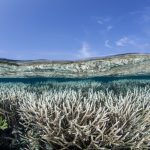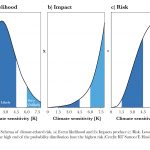 August 23, 2018 2:34 pm
Published by Jenny Rislund
August 23, 2018 2:34 pm
Published by Jenny Rislund
This paper examined the likelihood of extreme marine heatwaves global using climate models simulations, with and without anthropogenic influences, concluding that these events were up to fifty times more likely due to anthropogenic climate change.
 August 21, 2018 10:55 am
Published by Climate Extremes
August 21, 2018 10:55 am
Published by Climate Extremes
This report is not intended as a “science paper”, rather its designed to translate science into action and highlight risks in the way businesses, the military and emergency services should treat risk when it becomes existential.
 August 16, 2018 12:31 pm
Published by Climate Extremes
August 16, 2018 12:31 pm
Published by Climate Extremes
The Centre seeks a highly qualified and motivated individual to create new and innovative data assimilation algorithms for discovering model trajectories that closely track observations in the presence of multi-scale, non-linear and non-Gaussian uncertainties such as those associated with observations and forecasts of clouds, precipitation, aerosols, soil moisture, ice, or ocean colour.
 August 15, 2018 12:12 pm
Published by Climate Extremes
August 15, 2018 12:12 pm
Published by Climate Extremes
The study finds important regional consequences for precipitation and clouds formation if large changes in dimethyl-sulfide emissions were to occur. In a hypothetical case where all marine DMS emissions cease completely, we find the Earth would warm by approximately 0.5 degrees C over a ten-year period.
 August 15, 2018 10:43 am
Published by Climate Extremes
August 15, 2018 10:43 am
Published by Climate Extremes
CLEX researchers found that counter-clockwise rotating eddies in the Southern Ocean mix the ocean deeper in winter, allowing more nutrients to enter their interiors, leading to higher productivity. This work is important because eddy productivity plays a significant role in the exchange of carbon between the ocean and the atmosphere.
 August 14, 2018 11:33 pm
Published by Climate Extremes
August 14, 2018 11:33 pm
Published by Climate Extremes
This research demonstrates how cloud processes, steep mountains, tropical coastlines, the daily changes in solar insolation and planetary-scale waves work together to cause large variations in the tropical heating that drives global circulation patterns. Many of these effects are under-represented in global climate models.
 August 14, 2018 6:27 pm
Published by Jenny Rislund
August 14, 2018 6:27 pm
Published by Jenny Rislund
Using France as a case study, this project aims to create a climatology of heatwaves and droughts to investigate possible connections with voting patterns. The ultimate goal would be to help predict voting patterns in the future and to see whether the techniques could be applied more widely to other countries.
 August 14, 2018 6:25 pm
Published by Climate Extremes
August 14, 2018 6:25 pm
Published by Climate Extremes
In this project the vacation scholar will use models, observations and theory to better understand the processes driving ocean heat uptake in the Southern Ocean, with particular applications to sea-level rise.
 August 14, 2018 6:08 pm
Published by Climate Extremes
August 14, 2018 6:08 pm
Published by Climate Extremes
This research aims to explore subtropical mode water in the South Atlantic and investigate the physical processes behind its formation and variability.
 August 14, 2018 5:22 pm
Published by Climate Extremes
August 14, 2018 5:22 pm
Published by Climate Extremes
The Schools Weather and Air Quality (SWAQ) network is placing instruments in Sydney schools to fill gaps in meteorological and air quality observational sites (www.swaq.org.au). This project will contribute to the development of the SWAQ network and assess the influences of spatial variability in Sydney's urban climate and air quality.










